The real estate industry thrives on hustle. To truly succeed, efficient time management is paramount. Tracking your hours isn't just about meeting licensing requirements; it's about understanding where your time goes, optimizing your productivity, and ultimately, maximizing your income. This guide will help you create a powerful real estate professional tracking spreadsheet to manage your 750 hours (or more!) effectively.
Why Track Your Hours? More Than Just Compliance
Tracking your 750 hours (or the required hours for your specific licensing) isn't just about checking a box. It's a vital tool for:
- Meeting Licensing Requirements: This is the most obvious reason, but also the most critical. Accurate record-keeping ensures compliance and protects your professional license.
- Identifying Time Wasters: A detailed spreadsheet reveals where your time is actually spent. Are you spending too much time on administrative tasks? Not enough on client acquisition? The data provides the answers.
- Improving Time Management: By analyzing your tracked hours, you can identify patterns and implement strategies to improve your efficiency.
- Setting Realistic Goals: Understanding your current workload allows you to set achievable goals for future periods.
- Justifying Your Fees: Detailed records can be useful in demonstrating the value of your services to clients.
- Analyzing Profitability: You can correlate hours spent on specific activities with the revenue generated, identifying your most profitable endeavors.
What to Include in Your Real Estate Professional Tracking Spreadsheet
Your spreadsheet should be tailored to your specific needs, but here are essential elements:
Essential Columns:
- Date: This is crucial for tracking your hours across different time periods.
- Day of the Week: Analyzing your productivity based on the day can reveal patterns.
- Time In: Record your start time for each task or activity.
- Time Out: Record your end time for each task or activity.
- Total Hours: Calculate the difference between "Time In" and "Time Out."
- Activity/Task: Be specific! Examples include "Client Meetings," "Property Showings," "Marketing," "Administrative Tasks," "Continuing Education," "Networking," etc.
- Client Name (if applicable): Linking activities to specific clients helps you analyze your time investment in each relationship.
- Property Address (if applicable): This is vital for tracking time spent on specific properties.
- Notes: Add any relevant details about the activity, such as outcomes or challenges encountered.
Advanced Columns (Optional but Highly Recommended):
- Project Name: If working on larger projects, categorize your time accordingly.
- Revenue Generated (if applicable): Track revenue linked to each activity or project for accurate profitability analysis.
- Expenses Incurred (if applicable): Record expenses related to specific activities, such as mileage or marketing materials.
- Lead Source (if applicable): Track where your leads are coming from (e.g., referrals, online advertising, open houses).
Software Options for Your Real Estate Tracking Spreadsheet
While a simple spreadsheet program like Google Sheets or Microsoft Excel works, consider specialized options:
- Time Tracking Software: Numerous apps offer advanced features like automatic time tracking, invoicing integration, and detailed reporting.
- CRM Software: Customer Relationship Management (CRM) systems often include time tracking capabilities, allowing you to integrate time management with client management.
How to Use Your Spreadsheet Effectively: Tips for Success
- Consistency is Key: Update your spreadsheet daily for the most accurate data.
- Be Specific: Avoid vague entries. Detailed descriptions allow for better analysis.
- Regular Review: Set aside time each week or month to review your data and identify areas for improvement.
- Use Visualizations: Charts and graphs can make your data easier to understand and identify trends.
- Adapt and Refine: Your spreadsheet should evolve with your business needs. Regularly assess its effectiveness and adjust accordingly.
Frequently Asked Questions (FAQs)
What if I forget to track my time?
While daily tracking is ideal, if you miss a day, estimate your time as accurately as possible. Consistency is more important than perfect accuracy in the long run.
How detailed should my activity descriptions be?
The more detailed, the better. Instead of "Client Meetings," try "Client Meeting with John Smith to discuss property at 123 Main Street."
Can I use this spreadsheet for tax purposes?
Yes, a well-maintained spreadsheet can be valuable for tax preparation. Consult with a tax professional for specific guidance.
What if my hours exceed the 750 requirement?
Many successful real estate agents work far more than 750 hours. This spreadsheet helps manage all your time, not just the minimum required for licensing.
By diligently using a well-structured real estate professional tracking spreadsheet, you'll gain invaluable insights into your business, improve your efficiency, and ultimately achieve greater success in your career. Remember, this isn't just about compliance; it's about mastering your time and building a thriving real estate practice.
